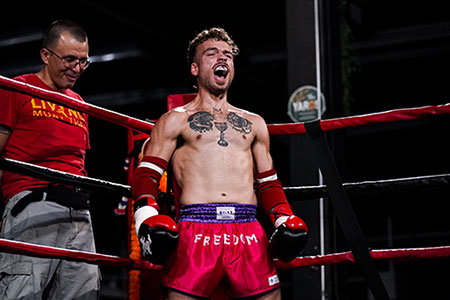In the dynamic world of Muay Thai, where tradition meets functionality, one distinctive feature captures the essence of both: the use of bicep ropes. These ropes, known as “Prajioud,” go beyond mere aesthetics, carrying deep cultural significance and playing a functional role in enhancing a fighter’s striking power. In this exploration, we unravel the tradition and power behind Muay Thai bicep ropes.
Muay Thai Bicep Ropes: Tradition and Symbolism
Cultural Significance:
Muay Thai is more than just a martial art; it’s a cultural heritage deeply rooted in Thai traditions. The bicep ropes, or Prajioud, are a visible expression of this cultural depth. These colored ropes symbolize respect for the art, the fighter’s gym, and the rich cultural heritage of Muay Thai.
Rituals and Ceremonies:
Before a fight, a Muay Thai fighter, adorned with bicep ropes, performs the Wai Kru Ram Muay, a pre-fight ritual steeped in tradition. The act of wearing bicep ropes during this ceremony signifies the fighter’s commitment, respect for their trainers, and a connection to the ancient rituals of Muay Thai.
Functional Aspect: Enhancing Striking Power
Muscle Compression:
While the Prajioud serves as a symbol, it also has a functional aspect. The tight compression around the biceps may contribute to increased blood flow and provide support to the arms during intense striking. This compression not only aids in physical readiness but also becomes a part of the mental preparation for the impending battle.
Mental Focus and Warrior Mindset:
The act of putting on the bicep ropes is more than a physical ritual; it’s a psychological cue. It signals the transition into a warrior mindset, helping the fighter focus their energy, concentrate on the imminent battle, and channel the traditions of Muay Thai into their performance.
Choosing the Right Ropes: Tradition and Personal Touches
Color Symbolism:
The color of the bicep ropes holds specific meanings. Different gyms may have their own color schemes, with each color representing the gym’s heritage, the fighter’s experience level, or personal superstitions. Understanding the color symbolism adds another layer of appreciation for this tradition.
Personal Rituals:
Some fighters have personal rituals associated with their bicep ropes. The ropes might be a gift from a respected trainer or possess specific blessings performed by a spiritual leader. These personal touches make the tradition of wearing bicep ropes a deeply individual and meaningful practice.
The Evolution of Muay Thai Bicep Ropes: Tradition Meets Modernity
Traditional vs. Modern Practices:
While the core tradition of wearing bicep ropes remains, modern practitioners may adapt the practice using materials like elasticized bands. This adaptation showcases the evolving nature of Muay Thai, demonstrating its ability to embrace change while preserving its cultural essence.
Cross-Cultural Influence:
In the global realm of Muay Thai, the tradition of bicep ropes transcends its Thai origins. Fighters from diverse cultural backgrounds, training in Muay Thai, incorporate this practice into their routines, contributing to the diversity and richness of this ancient martial art.
Conclusion: Embracing Tradition and Functionality in Muay Thai Bicep Ropes
Muay Thai bicep ropes are not just an adornment; they are symbols of a rich cultural legacy and a testament to the enduring spirit of this ancient martial art. Beyond the tradition and symbolism, these ropes play a functional role, contributing to a fighter’s physical and mental preparation for the challenges that await in the ring.
As you witness Muay Thai fighters donning colorful bicep ropes, recognize the depth of meaning and purpose behind this tradition. It is a visual representation of the fighter’s journey, their connection to Muay Thai’s heritage, and a practical element that may enhance their striking power. Muay Thai bicep ropes epitomize the harmonious blend of tradition and functionality in the dynamic world of martial arts.

